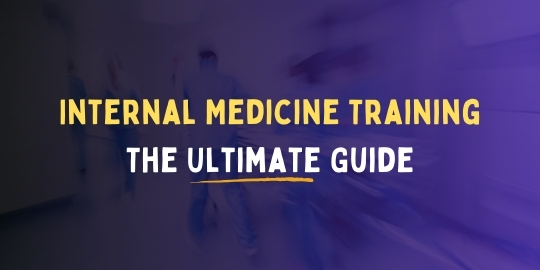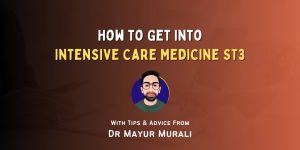
Published March 30, 2022 | Updated May 1, 2025
By MedCourse
Useful, relevant, and interesting content for UK Junior Doctors.
Let’s not kid ourselves – for eligible candidates, the self-assessment score for IMT application in 2024/25 is the single most important part of the application process (right up until the interview).
Scoring highly means you get a chance to interview for an IMT placement. Not only this but at interview a high application score means you’ll likely also do well in the “Application and Suitability” section.
The Internal Medicine Training application system has escaped the slow conquering march of the MSRA exam, at least for 2024, so shortlisting is still based on self-assessment scores.
In this article, we’ll go through the application scoring matrix for 2024/25, giving you the experience and advice from IMTs who have been thorugh the process in recent years.
Updated for 2024/2025!
Experience and Advice from High-Scoring Candidates
Justin, Priyanka, and Sashi have generously contributed to this article with their tips, advice, and experience. They all aced their applications and work with Optimise Interviews to help applicants nail their IMT Application and Interview.

Justin studied medicine at the University of Edinburgh and did his foundation years in Scotland, during which he successfully completed a part-time MSc in Clinical Education.
He subsequently moved to the Northwest to continue his training as an NIHR Cardiology Academic Clinical Fellow, and IMT.

Priyanka studied Medicine at the University of East Anglia. She enjoys teaching and pursued an intercalated degree in Medical Education at the University of Leeds.
Now she teaches in various capacities from face-to-face to online-based platforms. More recently, she has started as an IMT 1 trainee in the North West.

Sashi studied Medicine at Cardiff University. Following graduation, he completed the academic foundation programme at Imperial College London.
He enjoys teaching and has completed a PgCert in Clinical Education at the University of Edinburgh, leading a 9-month international teaching programme.
If this advice is useful, you should also check out the Optimise IMT course to help you nail your IMT application.
Key Documents
IMT Application Timeline
2024/2025 Round 1 Dates
| Vacancies published | Wednesday 23rd October 2024 by 5pm |
| Applications open | Thursday 24th October 2024 at 10am |
| Applications close | Thursday 21st November 2024 at 4pm |
| Longlisting close | Thursday 17th December 2024 |
| Invitation to interview | By Thursday 19th December 2024 |
| Interview booking deadline | First invites – Monday 23rd December 2024 Second invites – Monday 30th December 2024 |
| Interview window | Monday 13th January – Friday 14th February 2025 |
| Rankings Released | Tuesday 25th February 2025 |
| Programme preferences | Tuesday 25th February – Monday 17th March 2025 |
| Initial Offers out | Tuesday 19th March 2024 |
| Hold deadline | Thurs 3rd April 2025 at 1pm |
| Upgrade Deadline | Tuesday 8th April 2024 at 4pm |
| Post start date | Wednesday 6th August 2025 |
How Self-Assessment Scoring Works
Self-assessment scoring for the IMT application is done on Oriel while completing the full application form. See our application guide for advice on other parts of the form, including eligibility and commitment to speciality.
During this section (part 4 of the form) you will be asked to select options for each of the domains listed below so that an overall application score can be calculated. You have until 4pm on 21st November to submit this, so you have a bit of time to squeeze in an extra point or two, but don’t leave it too late.
5 Rules for Submitting Your Application
Don’t get caught out during your application – there’s a danger of having it thrown out if you break the rules.
The JRCPTB reports that it treats this very seriously if it appears to be a deliberate attempt to mislead. They leave the consequences unsaid, but could potentially include a talking to from a scary 3-letter organisation.
What’s a Good Score?
Scores will change from year to year depending on a number of factors including competition ratio, changes to the scoring system, and whether COVID had an impact on the applicants’ ability to gather points.
The data for 2023, which is important as there were major changes to scoring which also apply to the 2025 application, showed a mean of 17.83 and a median of 18 out of a total of 4292 applications. Note that this is out of 40, rather than the 30 points available this year.
IMT recruitment will try to get every single candidate an interview if possible. However, with competition ratios increasing year-on-year, a cutoff score is used.

What IMT recruitment doesn’t tell us, however, is what the shortlist cutoff is, so we tried to work it out ourselves using rigorous (un)scientific methods.
In 2023, 4292 applicants were whittled down to 3642 interviews (84.9%, for those without a calculator), meaning 650 candidates weren’t offered an interview.
As we don’t have the raw data, we had to use the graph given to us by IMT recruitment to calculate what this means for scoring. Looking at the number of candidates in each scoring category, we roughly calculated the score below which there were more than 650 scoring candidates.
Using this method, we can think that 650+ candidates scored 9 or below, so can reasonably(?) assume that a score of 10 or above gave the candidate an interview spot.
However, we can’t be sure about this, because other than human error in our guesstimation, the graph’s x-axis is (mis?)labelled “interview score” and only gives even numbers. We think, given there is a 40 on the x-axis, that each column represents the score given plus the odd score following this (so 0 actually means 0-1), but we don’t really know.
So, if you’re a fan of “rough and ready” data science, we assume that those who scored 10 or more in their 2023 self-assessment were shortlisted. This is equivalent to around 7.5 in 2024/25.
However, we don’t know what the range of scores will be for 2025, so it’s a safe to assume that to give yourself the best possible chance of success you should aim for a score of at least 12-15.
If we mucked up the data, or have done all this work and the numbers are actually out there somewhere, please get in touch.
3 Reasons You Need to Maximise Your Score
IMT isn’t as competitive as many of the higher medical specialities, but aiming for a high application score is useful for a few reasons:
Changes in 2025
Quite a few points scoring categories have changed in 2025!
The main changes are:
- Additional achievements and Leadership & Management being removed
- A shift in relative emphasis per domain (publications now count for up to 26.7% of the score!)
- Teach the teacher courses must now be taught by a live teacher (virtual or in-person, rather than self-paced)
| Section | Potential Changes | 2024 Points (% of total) | 2025 Points (% of total) | Relative Change |
| Postgraduate Degrees | Clarification in claiming broadly educational (non-teaching) qualifications. | 4 (10%) | 4 (13.3%) | ⬆️ |
| Removed! | 3 (7.5%) | 0 (0%) | 🔻 | |
| Presentations | Reduced points for top category. | 7 (17.5%) | 6 (20%) | ⬆️ |
| Publications | No change. | 8 (20%) | 8 (26.7%) | ⬆️ |
| Teaching Experience | Increased emphasis on evidencing feedback. | 6 (15%) | 5 (16.7%) | ⬆️ |
| Training in Teaching | Masters in MedEd no longer score here (but can be included in postgrad degrees). Teach the teacher courses must be taught by a live teacher – a.k.a. virtual or in-person, with self-paced courses no longer counting. | 3 (7.5%) | 3 (10%) | ⬆️ |
| Quality Improvement | Reduced point for top option. | 5 (12.5%) | 4 (13.3%) | ⬆️ |
| Removed! | 4 (10%) | 0 (0%) | 🔻 | |
| Total | Reduced by 25%! | 40 | 30 | -10 |
Thanks to Stephen from Oxford Medical for updating us.
Application Scoring Matrix 2025
Each section of the self-assessment score gives you points depending on which option you have selected. You won’t have to supply the evidence, but you will have to describe why you have selected each option in part 3 of the application form.
There are 5 sections to score points on during IMT application scoring, giving you a maximum of 30 points. These sections are:
The main tip for maximising your points while planning your IMT application is to sniff out opportunities. Work out which sections you can improve on most, and which points are easiest to gain. Be enthusiastic during ward rounds with your consultant and registrars. Ask around for projects that you know will improve your application or interview score.
Networking can go a long way, particularly when it comes to research and publications. If you can make a good impression with a senior colleague, ask them who the “go-to” consultant is for research, or who they think would be willing to help you get a publication. They might put a word in or give you tips on whether that consultant will reply to an email.
If you go to a course or conference and are inspired by a speaker or topic, try your hardest to pluck up the courage to go up to them and introduce yourself.
This can either be after their talk or later in the evening if there is a networking session.
From their perspective, they will almost always have projects and ideas for trainees to get working on (even if you have no initial knowledge of the topic). Even if you don’t want to take on any project work, you never know how many contacts you make at these sorts of events can help in your future career.
For example, I attended an Optimise interview course in preparation for my IMT/ACF applications, which was organised by Dr Balrik Kailey and I had several questions which were specific to my portfolio (which I didn’t want to publicly ask during the interview course).
I was nervous about approaching but decided to contact him directly, which in hindsight made a huge difference to my application. He was able to not only answer my questions but also helped me get involved in other projects which were great for my CV.
Postgraduate Degrees and Qualifications
If you started planning early, you can obtain a few extra points in the category of postgraduate degrees. Degrees earned following undergraduate medicine can either come from a break in training or by studying for a part-time master’s while working.
Intercalated degrees do not count any section. You can only include a degree here if it was completed before or after your time at medical school, not during.
There are 4 points available in this section:
- 4 points – PhD or MD (by research, using the UK definition of MD), including non-medical related qualifications
- 3 points – Masters level degree, including non-medical qualifications (not including intercalation!)
- 1 point – Other postgraduate diploma (PGDip) or certificate (PGCert) related to medicine, for which only graduate entrants can apply. You cannot claim for membership exams such as MRCP.
Masters in a teaching qualification will now count here, rather than in the training in teaching section.
Removed for 2025!
Presentations and Posters
This is a fantastic area to pick up some points during your foundation training or FY3 year, though you’ll have to make sure you have already met the criteria by the time you apply to IMT. Most projects, however small, can be easily presented to a local medical meeting to pick up a couple of points – though you should make sure you don’t also claim this work in another category.
Research and Quality Improvement Projects can easily be turned into a poster, and there are many medical conferences that accept posters from junior doctors. Some medical conferences have interactive screens rather than physical posters, meaning they can fit in as many posters (and sell as many tickets) as they want. You’d be surprised at how easy it is to have a poster presentation at a conference.
Oral presentations are more difficult, and you’ll need to ensure your abstract grabs the attention of your chosen conference when you apply. Some well-known consultants will be invited to speak at conferences on their projects. Find someone with a reputation, get yourself first or second on the author list, and ask to present it at a conference they’re speaking at, and you’ve bagged max points.
There are 6 points available in this section. For each section you must be listed as 1st or 2nd author:
- 6 points – Oral presentation at a national or international medical meeting
- 4 points – Poster shown at a national or international medical meeting
- 3 points – Oral presentation at a regional medical meeting
- 2 points – Poster at a regional or local medical meeting
- 2 points – Oral presentation at a local medical meeting
Conferences limited to one or more UK home nations (aka a Scotland-wide conference) will be counted as national.
Publications
Publications are another area you can bag lots of extra points if you plan ahead. Networking with research consultants or eager registrars can help you get case reports, research, and publications. Even if you don’t have the opportunity to perform your own research project, collaborating enough for you to be named as a co-author in a research publication can get you 6 points in this category.
You must plan carefully for this section – publications can take over a year from application to publication in a PubMed-cited format. You can still claim points if the publication is “in press” (accepted without any requested alterations, but not yet published).
There are 8 points available in this section:
- 8 points – First or joint-first author of one or more PubMed-cited original research publication
- 6 points – Co-author of one or more PubMed-cited original research publication
- 5 points – First or co-author of more than one PubMed-cited publication such as editorials, reviews, case reports, and letters
- 5 points – Author of one or more chapters of a book related to medicine (not including self-published books)
- 3 points – First or co-author of one PubMed-cited publication such as editorials, reviews, case reports, and letters
- 1 point – Published one or more abstracts or articles that are not PubMed-cited
Justin’s Tip for Research
A big tip that I learnt (too late!) on the Optimise Interviews application form course is that you can score maximum marks for a publication, even if you are a co-first author.
If I had known this in my foundation years, I would have pushed harder for the doctors I was working with on a research project in cardiology to put me as a co-first author. It takes nothing away from them and makes a big difference in terms of the points scored on the application form.
Teaching Experience
If you enjoy medical education, then this is an easy win for your application. It’s also a section in which you can earn points right up to the last few months before your application.
If your local department runs a regular educational meeting, you can approach the person in charge of this and ask whether you can organise this for more than three months, teaching regularly. If you are at a teaching hospital, you could also ask the undergraduate department or your department’s education lead if you can organise weekly or fortnightly teaching for medical students.
There are 6 points available in this section:
- 5 points – Work with local tutors to organise a teaching programme for healthcare professionals or medical students for three months or longer. You must regularly teach as part of this.
- 3 points – Provide regular teaching for healthcare professionals or medical students for three months or longer.
- 1 point – Occasional teaching for healthcare professionals or medical students.
To score points, you must get formal feedback, including independent verification of this from a tutor or organiser.
To gain 3 or 5 points, you need evidence of the programme content (such as a timetable) and a letter or form signed by a local tutor or organisation.
Priyanka’s Experience of Teaching
I got involved in teaching very early on during my foundation programme, helping the foundation programme coordinators with patient safety teaching, this allowed me to fulfil some aspects of the IMT application but also worthwhile reflecting on patient incidents.
Teaching is something anyone can get involved in and to organise a program for others whether it is at your ward or generally it all adds up.
Training in Teaching
Some trainees will have pursued a PGDip/PGCert in medical education or teaching. For those who haven’t, there’s only one point to gain here – but it’s an easy one to get, and if you have a study budget you can do it for free!
Booking a medical education course such as a “Teach the Teacher “ course can give you that easy extra point, so long as it’s “live”. Search our event calendar for applicable courses.
There are 3 points available in this section, which can only be earned if they are in addition to any training received as part of your primary medical qualification:
- 3 points – Higher teaching qualification such as PGDip or PGCert
- 1 point – Training in teaching which doesn’t qualify for 3 points
On-demand courses do not qualify for 1 point – it must be a “live” course, either in-person or virtual.
Sashi’s Experience of Teaching Qualifications
I completed a Postgraduate certificate in medical education at the University of Edinburgh. It allowed me to not only understand my own learning methods on the wards but allowed me to conduct effective bedside teaching for medical students.
At the time, I was also organising teaching programmes and reflections for the PgCERT and the course also permitted fellowship to the Higher Education Academy (FHEA) and membership to the Academy of Medical Educators. It was not just for the points!
Other courses which may be less resource-heavy include the Teach the Teacher course or locally organised teaching courses offered to medical education fellows.
Quality Improvement Projects
Quality Improvement Projects (QIPs) were an area of change for 2023 application scoring, with a focus on completing two full cycles of a QIP. This makes sense when you consider many will complete a QIP cycle as part of their foundation programme.
If you already have a QIP from your foundation years and can repeat another cycle, you’ve already scored maximum points. If you haven’t, it’s best to pick a relatively focused project in which you can perform rapid data collection cycles.
The important thing is that you pick a project where you can gather data quickly, make improvements, and then take another data cycle. If you only have a year until IMT application and your project requires 6 months of prospective data for data collection, you’re going to miss out – find something you can complete in a shorter timeframe.
Audits can count as Quality Improvement Projects, so long as you use QI methodology such as Plan, Do, Study, Act (PDSA) cycles. Mind the Bleep has a good article on audit and quality improvement projects if you need some inspiration.
There are 4 points available in this section:
- 4 points – Involvement in all aspects of a QIP, for two or more cycles
- 3 points – Involvement in some stages of two cycles of a QIP
- 3 points – Involvement in all stages of a single cycle QIP
- 1 point – Involvement in some stages of a single cycle QIP
Sashi’s Experience of Quality Improvement Projects
Be wary of those long and tedious audits/quality improvement projects offered to you as trainees. There is of course a time and place for this but be wary some of these end up going nowhere.
It’s always best to focus on ones that have very clear, simple, achievable outcome measures (SMART outcome or something like that) and you are able to do 3 cycles (maximum points!). On these local, smaller audits you can lead on them and potentially discuss them more passionately.
I did a simple VTE audit for COVID-19 patients and made some difference to VTE prescribing on a ward. Because I looked so passionate doing my VTE audit, the medical education team also awarded me a foundation leadership merit award!
All from a three-week VTE audit!
Removed
















